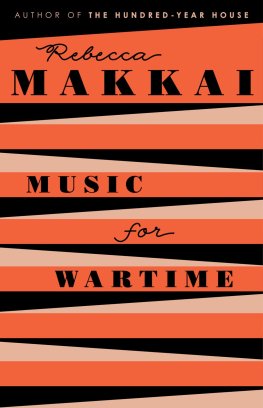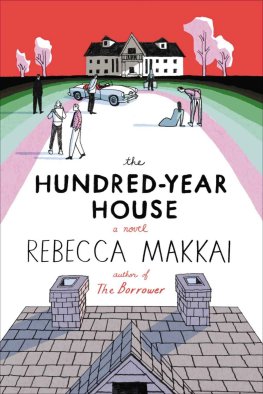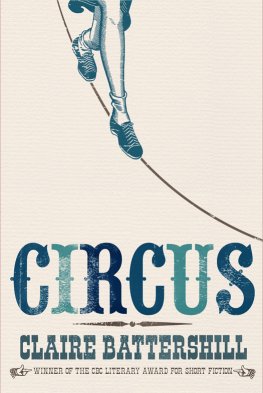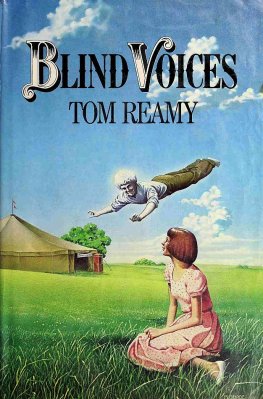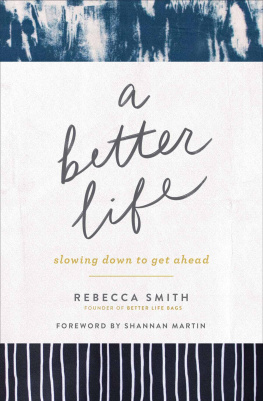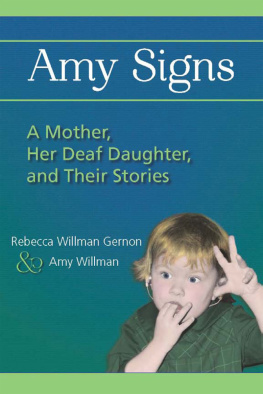Rebecca Makkai
Music for Wartime
Then why did you to the end,
live with the dark,
sing into your ruin?
Duane Niatum, Consulting an Elder Poet on an Anti-War Poem
The composer, with his tape recorder, crossed the barricades at night and crawled through the hills into the land his father had fled. Between the clotheslines, three cottages were still inhabited. Three old women still tended gardens and made soup and dusted once a month the trinkets of those killed. Once a month, they made their way through empty houses, empty streets, empty stores, empty churches. Once a month, they spoke the names of the dead.
The composer surprised the three women by speaking their dialect, knowing their words for spoon and daffodil and hat. At first they feared hed been sent by the dictator as a spy yet who but the son of a native son would know the story of the leaf child, the rhyme about the wolf maiden?
He lived with them a week and recorded (this had been his purpose) their songs, of which they were the worlds last three singers. A song of lamentation, a song of mourning, a song of protest and despair. They had forgotten the song for weddings.
Back safe across the border, the composer set scores around the songs, made records of string instruments wailing behind the womens voices. He was fulfilled: He had preserved, before its last breath, their culture.
When the dictator learned of the record, he became enraged. Not over the songs (what was a lamentation, to a dictator?) but over the evidence of life in a village he had been assured was wiped out in its entirety.
One October morning, he sent his men to finish the job.
(But Ive made it sound like a fable, havent I? Ive lied and turned two women into three, because three is a fairy tale number.)
When the nine-fingered violinist finally began playing, Aaron hid high up on the wooden staircase, as far above the party as the ghosts. He was a spider reigning over the web of oriental rug, that burst of red and black and gold, and from his spider limbs stretched invisible fibers, winding light and sticky around the forty guests, around his parents, around Radelescu the violinist. There were thinner strands, too, between people who had a history together of love or hate, and all three ghosts were tied to Radelescu, to his arcing bow. But Aaron held the thickest strings, and when he thought, breathe, all the people breathed.
After dinner, his mother had not nodded him up to his toothpaste and away from the drunken conversations as she had when he was nine, ten, eleven, and Aaron wondered whether shed forgotten in the wine and noise, or whether this was something new, something he could expect from now on. To be safe hed changed to pajama pants and a white T-shirt, so he could claim hed come down for water. He remembered to muss his hair, staticky enough on its own but now a halo of rough brown in the bedroom mirror. Through the balusters, he watched the man and his violin duck in and out of the yellow cone of light that fell from the lamp above the piano. Yesterday morning, Aarons mother had brought Radelescu a plate of scrambled eggs with parsley and toast as he sat at the bench, slowly picking out the chords of the accompaniment and marking the score. Tonight, she played the accompaniment for him.
Aaron guessed that by moving in and out of the light, Radelescu was blinding himself to the room, to the eager faces and cradled wineglasses of the greedy listeners. Now, as the old man began to play faster, Aaron felt tired, and he needed the bathroom, but he didnt want to move himself from the wooden step and away from the music. His throat had been sore all day, glue and needles, but now he was able to forget that. He squinted to see the stump of Radelescus chopped-off finger, to see if he held the bow differently than other people, but the arm moved too fast.
Behind Radelescu, leaning against the fireplace, Aarons father rolled the cup of his empty wineglass back and forth between his hands, eyes closed. Aarons father was the luckiest man in the world. Exhibit A: Hed been rescued from drowning three different times. Exhibit B: The third time was by an American pianist much younger than he was, a woman so beautiful he married her and she became Aarons mother. Exhibit C: He left the university, and Iai, and Moldavia, and all of Romania on June 20, 1941, nine days before the start of the Iai pogrom. Exhibit D: He left because he had won a scholarship to Juilliard and it took a long time to cross the ocean in an ocean liner, especially in the uncertain time of war, and once youve gone to Juilliard you have connections, and connections are what matter in life, even more than talent.
Aaron could not hear much difference between this music and that on Radelescus last record, the one from 1966 with no cover. The man had aged twenty-four years since then, and this perhaps accounted for the small moments of shakiness, the vibratos that warbled on the far side of control. He was old. The hair stuck out from his head in white, wavy lines. The wrinkles on his face were carved deep, and the ones across his forehead were as wavy as his hair. Radelescu spoke only a little English, and Aaron spoke no Romanian at all, so at dinner the night before, Aaron and his mother had sat quietly while the two men spoke. Occasionally, Aarons father would translate something for them, but it was only about the concert preparations or the delicious food. Later, when Radelescu overheard Aaron talking to his mother about the book report due Monday, the old man began to laugh. Aarons father translated that he was amused to hear a child speak English so quickly and so fluently. And so all day today, Aaron had tried to speak faster and louder and use longer words. Pathetic, he had said at lunch, and electrocution and cylinder. When Radelescu asked to borrow Aarons rosin for his own bow, Aaron had said, Indubitably.
In the afternoon, Aaron had gone with the two men to the Jewel-Osco. He assumed they were there to pick up some last things for the party, but then they simply went and stood in the middle of the produce section. They stood a long time by the bins of different apples, pointing at mushrooms and grapefruits and bananas and speaking Romanian. Radelescu was happy, but there was something else on his face, too, and Aaron tried to read it. Devastation, maybe. When a lady passed with her plastic basket, Aaron pretended to investigate the tomato display. Finally they got a cart and began to walk through the aisles, grabbing olive oil, seltzer, five kinds of cheese. They returned to the produce section, where Aarons father put five bunches of green onions in the cart and handed Radelescu a bright tangerine. Radelescu said something, laughed and then, pressing his mouth to the orange skin, kissed the fruit.
Aaron could feel now that the people in the room below were breathing less, as if afraid to propel the old man back to Romania on the wind of their exhalations.
And no, he could not actually see the three ghosts with their violins the three students who died in 1941but he knew where they would be and he traced their flight with his eyes, over the crowd, around the light, against the ceiling. Until he was ten, whenever Aaron was sick or bleeding, his father would say the same thing: May this be the worst pain you ever feel. By which he meant: This is nothing. American boys will never receive thin-papered letters by airmail that their mother, father, two sisters, one brother, grandparents, uncles and aunts, thirteen cousins, have all been killed. You do not know suffering.
But that changed two years ago, when they all went to West Germany before his fathers concert in Bonn. It was the closest Aaron had ever been to Romania, though now that things were suddenly different his father promised a trip before the year was out. As they pulled their luggage through the streets of Bonn, jet-lagged, Aaron had felt a spook, a chill, something that made him want to run, and, half-asleep, almost dreaming, he dropped his backpack to break off around the corner and down an alley until he came to a kind of park. He couldnt feel his legs. He had run toward the chill, he realized, not away from it. He did not picture dead bodies, he did not see ghosts or hear voices, but he felt something terrible and haunted, the skin-crawl of being alone in a house and pressing your back to the wall so nothing can get behind you. When his father caught him hard by the arm and asked what he was doing, Aaron said, This is where all the people died. He didnt mean it, didnt believe it, but these words were the only way he could express his strange nausea, the feeling that he was surrounded by graves. His eyes must have looked scared and honest enough, because when they finally found the hotel, his mother asked the old, long-nosed concierge the history of the square. Yes, yes, there was a synagogue, he said. A terrible massacre. This is 1096, almost a thousand years. And his parents looked at each other, and his father said something in German to the concierge, and his mothers face became lighter than her hair. Aaron was as shocked as his parents, and he spent the rest of the trip wondering whether this was luck, maybe inherited from his father, or a real vision he just hadnt known enough to trust fully.

